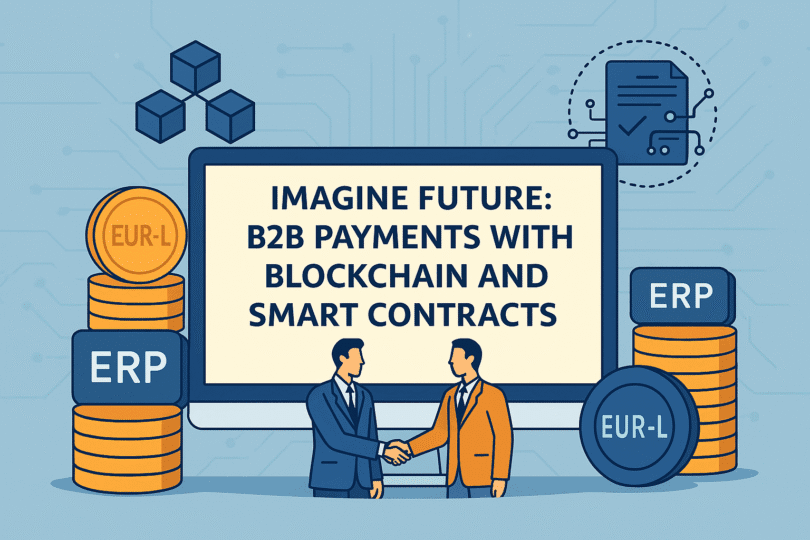Maybe in 20 years – or less, who knows – the today payment systems will be only history. Let’s face it: in today’s digital economy, businesses still face surprisingly archaic payment systems. Cross-border B2B payments often take days, cost significant fees, and lack transparency.
Let’s imagine the future payments systems and the way corporations will exchange value globally in 20 years from now on.
DISCLAIMER: The following article describes a fictional network called PayLink, imagined as a seamless solution for B2B payments. In reality, PayLink does not exist — it is merely the product of an overly vivid imagination.
The Problem with Traditional B2B Payments
When a foreign corporation purchases goods from a Romanian supplier today, the payment journey is far from straightforward:
- It passes through multiple banking intermediaries
- Takes 1-3 business days (sometimes longer – try making a payment in MAD from a EUR account opened in Romania — you’ll age in seconds.)
- Incurs sizeable fees and unfavorable exchange rates
- Requires manual reconciliation in corporate ERPs
- Offers limited visibility during the transaction
These inefficiencies cost global businesses billions annually in fees and administrative overhead.
What is PayLink Network?
PayLink Network reimagines B2B payments as an instant, borderless, and cost-effective system by connecting corporate ERP systems directly through regulated blockchain technology.
At its core, PayLink Network is a global payment infrastructure that enables corporations to make instant payments directly to other businesses without traditional banking intermediaries. It connects major ERP systems (like SAP, Oracle, or TMSs) through a secure blockchain network using regulated stable coins.
Key Components:
1. Corporate Treasury Wallets
Each company maintains a digital wallet connected directly to their ERP system. These wallets store regulated stable coins (digital currencies pegged 1:1 with traditional currencies like EUR or USD).
2. Regulated Stablecoins
Digital tokens like EUR-L or USD-L that are fully backed by real currency reserves held by banks or licensed financial institutions. Unlike volatile cryptocurrencies, these maintain stable value as they are backed by actual currencies held in bank accounts.
3. Smart Contracts
Automated agreements in code that verify conditions before releasing payment:
- Confirm goods were received in the ERP
- Verify invoice approval
- Check for any payment disputes
- Apply programmed payment terms
4. ERP Integration
Direct connections to corporate finance systems enable seamless workflows without manual intervention.
How a Payment Works on PayLink Network
- Company A’s ERP system issues an invoice to Company B
- The invoice details are securely transmitted to the PayLink Network
- When Company B receives the goods, their ERP system updates automatically
- Smart contracts verify all conditions are met (goods received, payment terms, no disputes)
- Payment in stable coins is released instantly from Company B’s wallet to Company A’s wallet
- Both ERPs are updated in real-time with payment confirmation
- The entire transaction is completed in seconds rather than days
The Advantages Over Traditional Systems

Regulatory Framework
Unlike many blockchain projects, PayLink Network is designed to operate within existing financial regulations:
- Collaboration with central banks
- Compliance with GDPR, SOX, AML, and KYC requirements
- Regulated stable coins backed by 100% reserves in current accounts
- Regular auditing by major accounting firms
- Transparent transaction record for tax authorities
Market Position: Blue Ocean Opportunity
While some elements of this system exist separately, no single solution has combined them into a comprehensive B2B payment network:
- JP Morgan Coin operates only within JP Morgan’s customer base
- EUROe and USDC/EURC lack ERP integration
- DeFi solutions aren’t designed for corporate treasury needs
- Central Bank Digital Currency projects move slowly and lack B2B focus
PayLink Network represents a “blue ocean” opportunity – a space where the technology exists but hasn’t been fully implemented for corporate use.
Real-World Example
Imagine a German manufacturing company purchasing €50,000 of components from a Romanian supplier:
Current Process:
- Invoice received and approved in SAP
- Payment instruction created manually
- Bank processes international wire transfer
- 2-day processing time
- €75 wire fee plus unfavorable exchange rate markup
- Possible, manual reconciliation on both sides
PayLink Process:
- Invoice issued then sent, received and approved in SAP – both entities.
- Goods receipt registered automatically – both entities.
- Smart contract verifies all conditions
- €50,000 in EUR-L stable coins transfers instantly to supplier
- Both ERPs update automatically
- Near-zero fees
- Immediate confirmation and reconciliation

Looking Forward
The global B2B payments market exceeds $120 trillion annually, with billions spent on fees and administrative costs. PayLink Network represents not just an incremental improvement but a paradigm shift in how businesses exchange value.
While blockchain technology often makes headlines for cryptocurrency speculation, the real revolution may be happening quietly in corporate finance departments worldwide – making global commerce more efficient, transparent, and accessible than ever before.
Let’s see if authorities will be less lazy and finally catch up with the pace of innovation — or if they’ll continue clinging to legacy systems and outdated regulations while businesses quietly build the future without them.
Because in the end, progress doesn’t wait. And neither do the companies tired of slow, expensive, and opaque cross-border payments.








Leave a Comment
You must be logged in to post a comment.